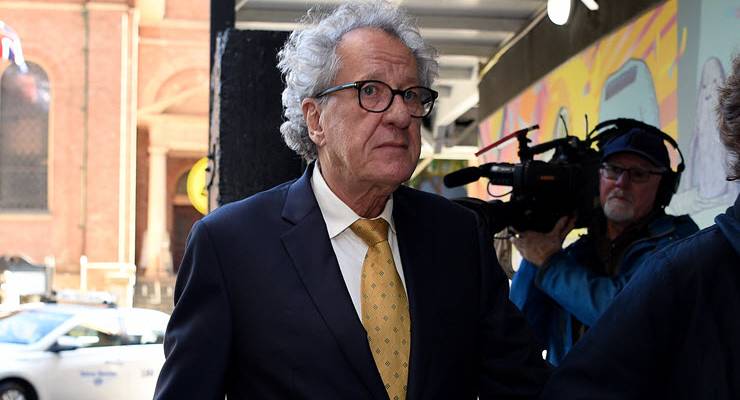
Rupert Murdoch’s News Corp has lost its epic legal battle against actor Geoffrey Rush, with a blistering judgement from the full bench of the Federal Court rejecting its appeal over last year’s defamation finding and upholding a record defamation payout of $2.9 million.
Today’s judgement comes almost three years after The Daily Telegraph published its now infamous “King Leer” front page, and brings to an end one of the most high stakes defamation trials in Australian history — a battle between a media giant and a Hollywood icon, and one that turned Australia’s Me Too movement on its head.
On Thursday, the court said it stood by the judgement that found the Telegraph’s two 2017 front-page stories accusing the actor of inappropriate behaviour implied Rush was a “pervert”, and rejected News’ argument that the judge had erred in finding that actress Eryn Jean Norvill gave unreliable evidence.
The appeal verdict was handed down by justices Jacqueline Gleeson, Richard White and Michael Wheelahan.
Norvill was never interviewed for the Telegraph’s story but agreed to give evidence at the trial in 2018, where she claimed Rush had sexually harassed her during preview performances of King Lear by stroking down the side of her breast to her hip.
But Wigney was scathing of Norvill as a witness, saying there were issues with her credibility and reliability, and was prone to exaggeration.
In its appeal, News Corp argued that Wigney had erred in finding that Norvill gave unreliable evidence. It also argued that the amount awarded to Rush was excessive, and asked for a retrial before a different judge.
But the court rejected this, saying it did not accept that the trial judge had overlooked difficulties Norvill may have experienced in giving evidence as a person complaining of sexual harassment.
“[Wigney] referred to the vulnerability of their position, the stress involved in giving evidence about such matters and the distress which being required to recall such matters can cause,” it said.
News Corp’s lawyers had also argued the judgement hadn’t dealt with the issue of imbalance of power in the relationship between Rush and Norvill.
The court made several references to the power imbalances — but ultimately dismissed the argument that Wigney had not dealt with it in his judgement. While the full court noted Wigney didn’t refer to the power imbalance in his judgement, the appeal judges wrote: “We do not consider that this means that it was overlooked.”
Like Wigney, the appeal judges scrutinised Norvill’s willingness to engage with Rush given her testimony she had felt “compromised”, “pressured”, “extremely intimidated”, “frightened”, “threatened” and “panicked” during the King Lear production.
They questioned Norvill’s willingness to go out to dinner and a play with Rush, and found a text message sent by Rush — which said “I was thinking of you (as I do more than is socially appropriate) [winking emoji]”, would have been inappropriate had the pair not had a history of texting nicknames to one another.
Norvill had said she had responded to Rush’s emails affectionately because she was in “survival mode” and afraid.
The verdict comes at a time when the Me Too movement is back in the spotlight, with the court system facing a reckoning over how one of its own powerful figures, former High Court judge Dyson Heydon, wielded his power through alleged sexual harassment.
Unlike the trial and appeal hearings, which attracted huge media attention, the decision was published online, with parties not required to attend due to COVID-19.
Norvill and Rush’s lawyers declined to comment on the decision.
Daily Telegraph editor Ben English said in a statement that while the paper respected the findings of the court, the case “exposes the inadequacies of Australia’s defamation laws”, and heightened the need for urgent legislative reform to encourage women to come forward with their concerns.
“In that context we are very disappointed that the appellate court did not reverse Justice Wigney’s findings as to the credibility of Eryn Jean Norvill or reverse his honour’s decision to exclude the testimony of Yael Stone. We support both women in their decision to share their complaints,” he said.
He added that the paper would continue to report on these issues “which are of great concern to the Australian public. As stated by High Court Chief Justice Susan Kiefel last week, there is no place for sexual harassment in any workplace.”









Crikey encourages robust conversations on our website. However, we’re a small team, so sometimes we have to reluctantly turn comments off due to legal risk. Thanks for your understanding and in the meantime, have a read of our moderation guidelines.